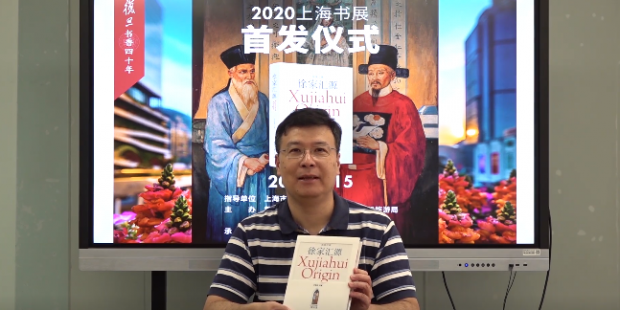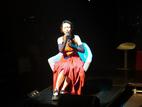On August 15, 2020, the book launching ceremony of Shanghai book fair for The Origin of Shanghai School: Xujiahui Origin was held in the Shanghai Exhibition Center. Scholars, artists and the press from Fudan University recalled the influence on Shanghai and Shanghai culture of the meeting between Ming dynasty scholar Xu Guangqi and Matteo Ricci, the first Catholic missionary to China. A 13th generation descendant of Xu, Xu Chengxi, also attended the ceremony.
When talking about Shanghai culture, one needs to mention "the Origin of Xujiahui", which is a tourist and cultural attraction that Shanghai has made great efforts to build in recent years. Xujiahui, in the center of southwest Shanghai, was named after Xu Guangqi, a Catholic who lived during the Ming Dynasty. Xu Guangqi lived, built property and wrote books here. His descendants also gathered here, and the place was first named Xujia Village. As it was at the confluence of the Zhaojiabang, Puhuitang and Fahua rivers, it was also the place where the Xu family lived, so it was also known as "Xujiahui." Here you can see many of the historical sites from when the Xu Guangqi’s family first started running the place. It was their reclamation here that laid the initial foundation for the later construction of Shanghai.
Xu Guangqi is recognized as representative of modern Shanghainese. Li Tiangang, a professor at the Institute of Religion and Philosophy of Fudan University and a disciple of Zhu Weizheng, has written extensively on the history of cultural exchanges between China and the West. He combed through Xu's achievements and called him "the most outstanding Shanghainese in the past 400 years."
"Some 400 years ago, Shanghai became a bridgehead for cultural exchanges between China and the West, a city with a rich tradition of cultural exchanges," said an organizer of the launch of the new book at the Shanghai Book Fair in 2007. "We proposed that ‘Xu Guangqi was the first person to conduct cultural exchanges between China and the West’, much earlier than Lin Zexu and he learned better. In today's Xujiahui Origin, we can see a very wonderful history and feel the practical significance of the meeting between Xu Guangqi and Matteo Ricci in the new era. Xujiahui Origin, edited by Fang Shizhong and published by Fudan University Press, shows the past and present life of many scenic spots in Xujiahui Origin, an important place for cultural exchange between China and the West in Shanghai. It opens a new guide for the new era and injects new contents into the city spirit of Shanghai. The book is also a collection of the research achievements of many experts and scholars, as well as the highlights of lectures on the forum, providing a diverse perspective and multiple discoveries for entering the Origin of Xujiahui and reading "the origin of Shanghai School."
In April last year, Fudan University professor Li Tiangang, contributing editor and author of the book Xujiahui Origin, talked with Xu Guangqi's descendant Xu Chengxi about The Integration of China and the West——Xu Guangqi and Matteo Ricci: Meeting again in a New Era."
"Xu made up his mind as a child," Li said, "He believed that a person should be upright in conduct, ward off evil thoughts, study, and protect the country and the people. His eight-part essay was not very good, but he had a good knowledge of the practical application. As an official, he also wanted to contribute his strength to the country and the people. Therefore, he took the national affairs as his duty and set high demands on himself. He always believed that "the thing a Confucian doesn’t know brings shame on him" and that a man should feel ashamed if he does not know something. So he traveled ten thousand miles and read ten thousand books, and he was also devoted to learning and pursued truth. Today, we know that he was ahead of the intellectuals of his time and much more honest and upright than the bureaucrats of his time. Xu Chengxi recalled his ancestor, "Although before his death, he received a bachelor's degree from the Imperial Library, ranking ‘below one person and above ten thousand people’, he lived a very poor life. On his 70th birthday, he refused to celebrate his birthday with anyone, so that he could live a clean and honest life. At the same time, he pursued personal independence, was full of religious compassion, and was close to the people of the country. His spirit was also the treasure of our family."
The two also talked about a famous historical painting that depicts Xu Guangqi and Matteo Ricci talking about Dao (The origin and rules of everything). "Xu Guangqi and Matteo Ricci are about the same height," Li said, “ We do not know the actual height of Matteo Ricci and Xu Guangqi. I think it is the painter's design to put two people on an equal footing. One represents the East, one represents the West; one is wearing a black gauze cap of the Ming Dynasty, the other is wearing a Confucian crown and cotton clothes. Xu and Matteo Ricci are equal, so are east and west. They are in dialogue with each other. Since 1670, when this painting appeared in published paintings and books in Europe, Europeans have assumed that there was such a relationship. Xu Guangqi and Ricci were talking about the knowledge of 'Heaven' in an equal way. We call it the 'Xu-Ricci Talk'."
"The friendship between these two people and the business they have started are very beneficial to our development today," Li said of the combination of Chinese and Western elements they represent. The relationship between these two people, like the painting, is equal and reciprocal. I once read a book and found that the contemporary British and American philosopher Taylor once proposed that the relationship established 400 years ago by Matteo Ricci and Xu Guangqi should be an example for human beings. Western culture and Chinese culture are different from each other, but when they intersect with each other, the two sides emphasize close cooperation rather than entanglement. This cooperation is not only a mutual study but also a sharing of faith. This relationship not only preserves diversity but is more positively universal, which is the best inspiration both of them have given to contemporary people."
- Translated by Nicolas Cao











